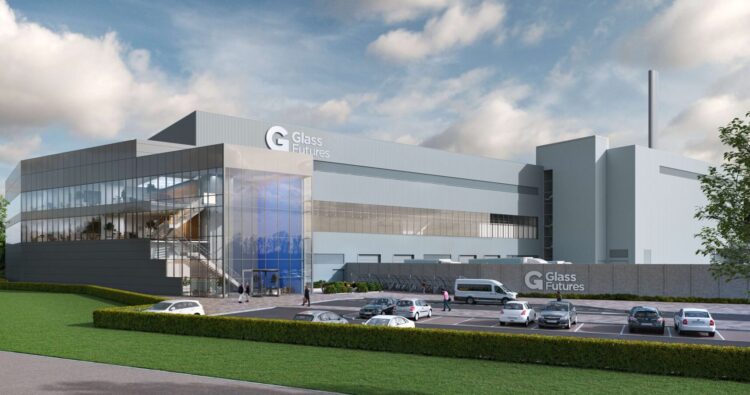Work is under way on Glass Futures – £54m global centre of excellence in Liverpool city region – and the man who will run it says it has the potential to ‘change the world’. Tony McDonough reports

A £54m Liverpool city region facility that will seek new decarbonised ways of making glass “has the potential to be world-changing”.
That is the view of Richard Katz who will be chief executive of Glass Futures in St Helens. It will create 80 new jobs in a town that has been associated with glassmaking for more than 200 years.
In December 2021, site owner and developer Network Space Developments (NSD) appointed building contractor Bower & Kirkland to deliver the building at Saints Retail Park.
In February a groundbreaking ceremony took place on the 165,000 sq ft global glass research and innovation facility. It is expected to be completed in January 2023, ready for internal fit-out.
Liverpool City Region Combined Authority is investing £9m into the project. A further £15m is coming from the Government’s UK Research and Innovation fund. Glass sector companies will contribute a further £20m in resource, time and equipment.
“I believe Liverpool city region can become the catalyst for real change around the world because of its focus on innovative research and development.” said Richard. “We chose St Helens, as the UK’s home of glass, because of the region’s clear focus and drive to innovate.
“As we face a climate emergency, we all need to decarbonise. Glass is a fundamental part of the problem. It is used in all aspects of everyday life from mobile phones to infrastructure. Crucially, it can be a vital part of the solution.
“Having worked in and represented the glass industry for many years, we knew that if the sector didn’t evolve and reinvent itself, it risked falling behind.
“But how can the industry improve its technical methods and make positive changes without the opportunity to experiment, to try new ways of working, to test emerging theories?
“That’s why we developed the idea for our pilot plant for research and experimentation. Carbon has become the energy and enemy of the world. We need to replace high carbon natural gas in the production of glass to benefit the whole industry worldwide.”
St Helens has long been associated with glassmaking. In 1773, the British Caste Plate Glass Company was established at Ravenhead, now part of the town. In 1826 St Helens Crown Glass Company was founded by the Pilkington and Greenhall families.

In 1845 the name of the business was changed to Pilkington Brothers and the Pilkington name became famous across the world for glassmaking excellence. In June 2006, Japanese glassmaker Nippon Sheet Glass (NSG) completed a £1.8bn takeover of the firm.
In August 2020, as part of the HyNet hydrogen project, Pilkington achieved a global first by firing 100% hydrogen in part of its furnace. This demonstrated that the full furnace could be run on the hydrogen blend, without compromising on quality standards or operational performance.
Richard added: “From our base in Sheffield, we chose St Helens because it’s very much a glass town. We could see the ambition and opportunity of both St Helens Council and Liverpool city region.
“Existing world-leading research across the public, private and academic sectors has already put the region on the map for breakthroughs in sectors including healthcare and materials.
“But the commitment of St Helens and Liverpool city region to support and invest in research and development means the region will continue to push boundaries. It will be at the forefront of real solutions that will ultimately change the world.”
Richard has been appointed to the Liverpool City Region Combined Authority’s Innovation Board. This is the first sub-regional board of its kind in the UK. He added: “I’m delighted that Glass Futures is part of the new Innovation Prospectus designed to help attract funding for the £10bn-plus investment-ready regional projects.
“Aside from acting as a catalyst for change, investment in opportunities such as Glass Futures, will create thousands of local jobs and boost local economies.”

